Unit 4 Lesson 19 A Story or a Poem? 课件2022-2023学年冀教版英语九年级上册(共36张PPT)
文档属性
| 名称 | Unit 4 Lesson 19 A Story or a Poem? 课件2022-2023学年冀教版英语九年级上册(共36张PPT) | 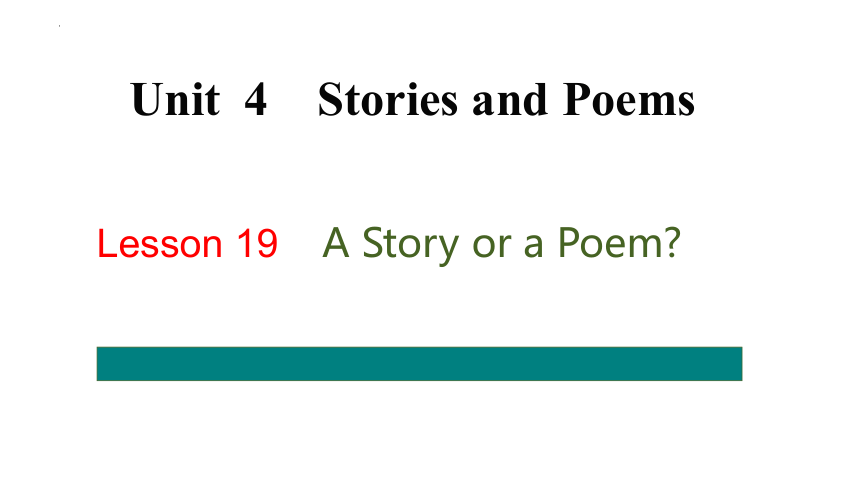 | |
| 格式 | zip | ||
| 文件大小 | 828.6KB | ||
| 资源类型 | 教案 | ||
| 版本资源 | 冀教版 | ||
| 科目 | 英语 | ||
| 更新时间 | 2022-09-28 11:15:30 | ||
图片预览

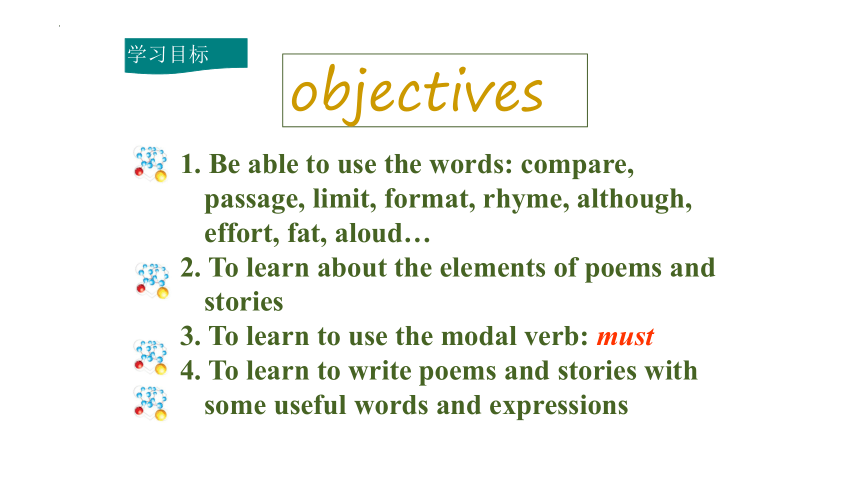
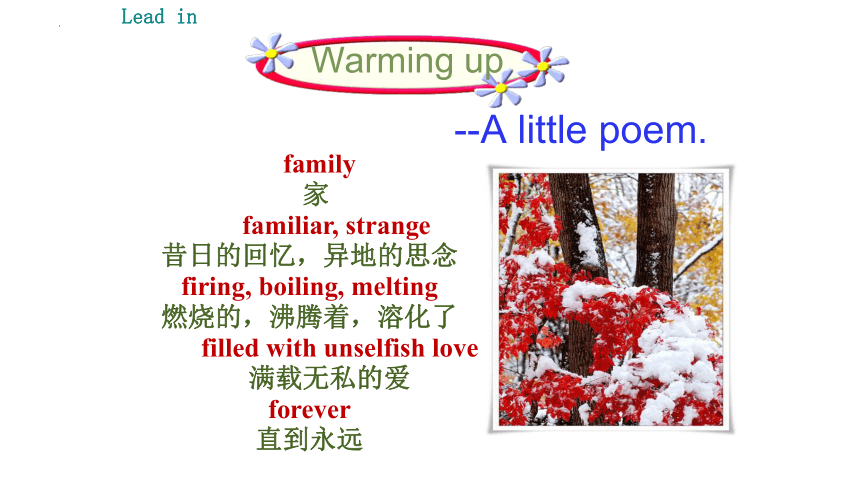
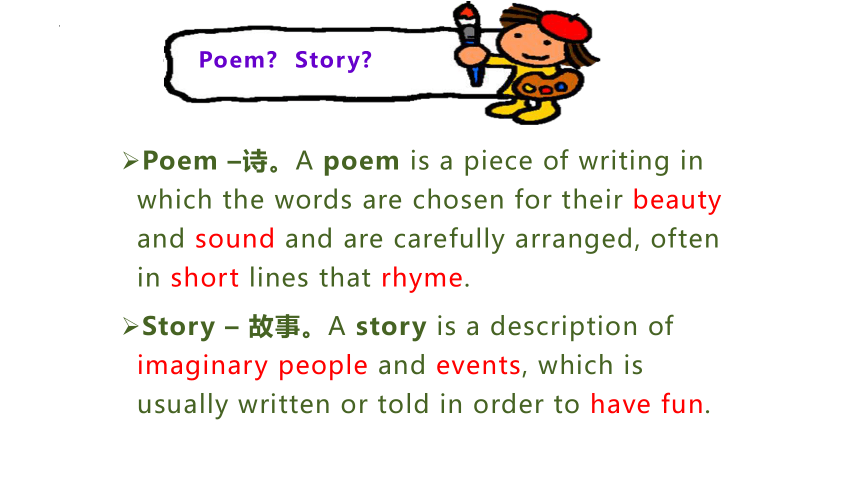
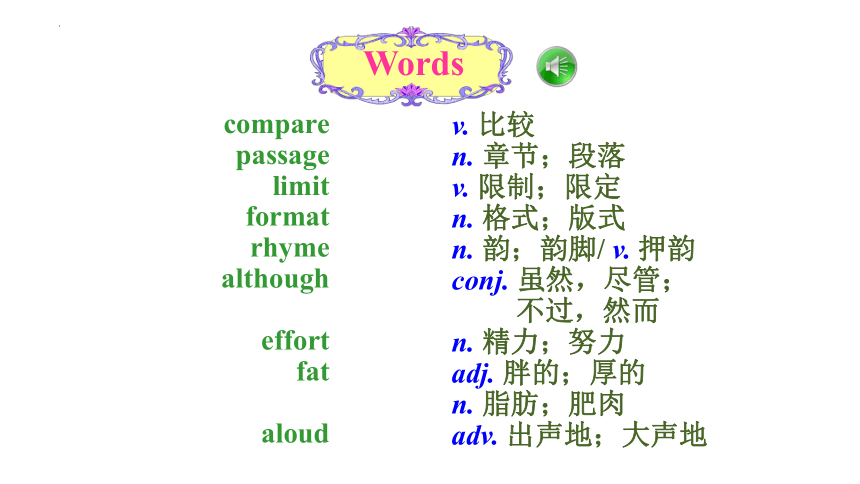
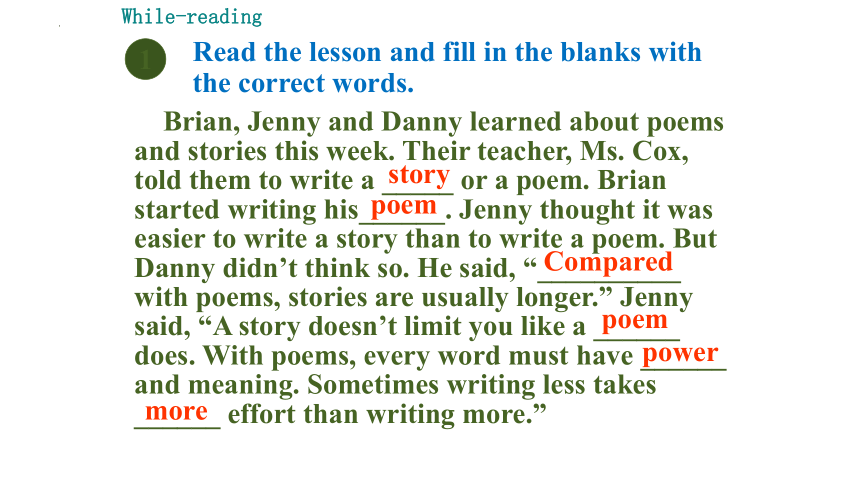
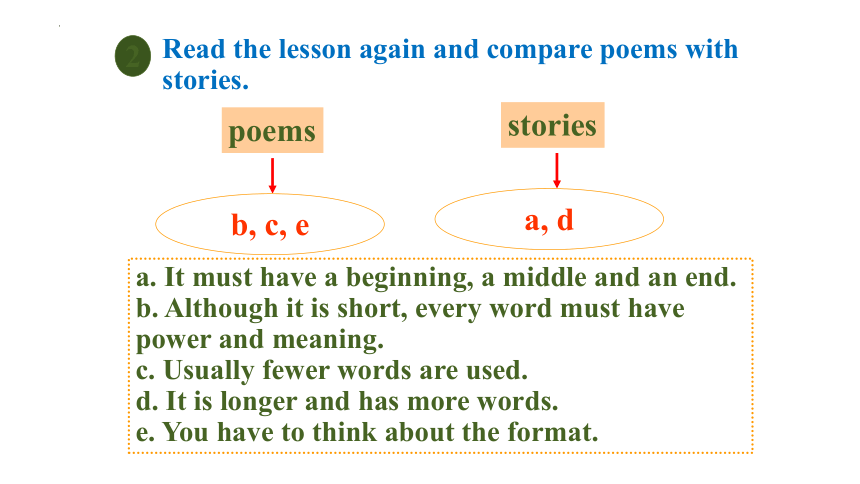
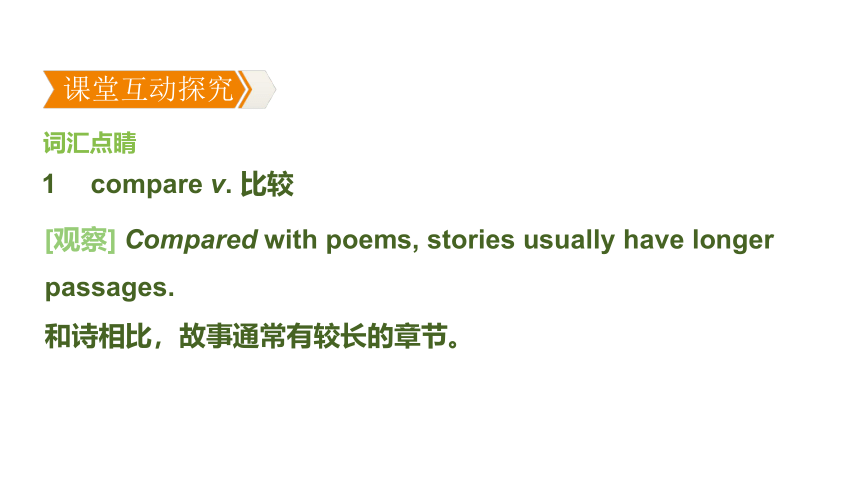

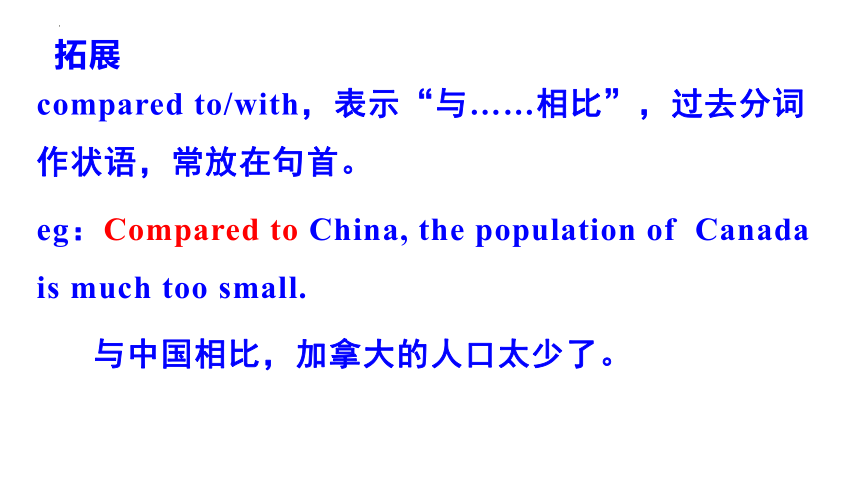
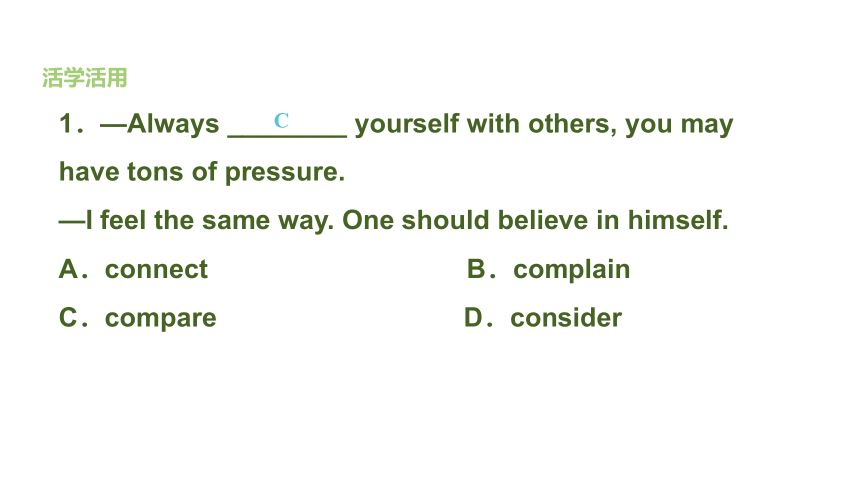
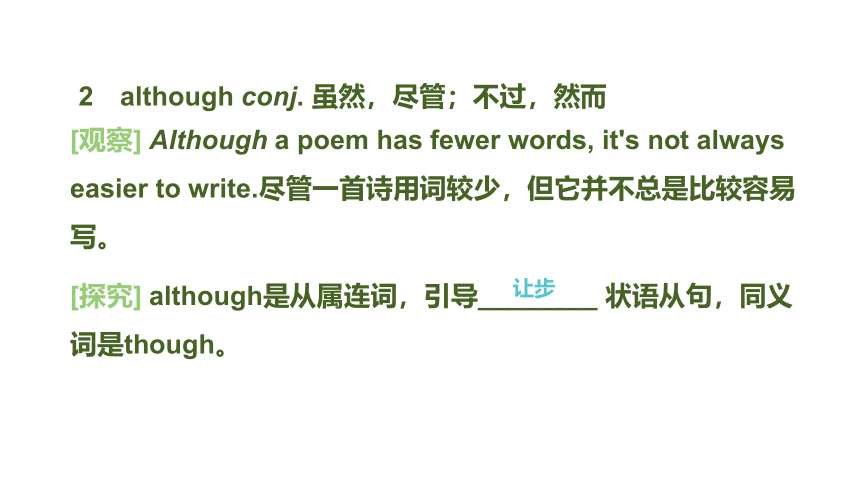
文档简介
(共36张PPT)
Lesson 19 A Story or a Poem
Unit 4 Stories and Poems
学习目标
objectives
1. Be able to use the words: compare, passage, limit, format, rhyme, although, effort, fat, aloud…
2. To learn about the elements of poems and stories
3. To learn to use the modal verb: must
4. To learn to write poems and stories with some useful words and expressions
Lead in
Warming up
--A little poem.
family
家
familiar, strange
昔日的回忆,异地的思念
firing, boiling, melting
燃烧的,沸腾着,溶化了
filled with unselfish love
满载无私的爱
forever
直到永远
Poem Story
Poem –诗。A poem is a piece of writing in which the words are chosen for their beauty and sound and are carefully arranged, often in short lines that rhyme.
Story – 故事。A story is a description of imaginary people and events, which is usually written or told in order to have fun.
Words
compare
passage
limit
format
rhyme
although
effort
fat
aloud
v. 比较
n. 章节;段落
v. 限制;限定
n. 格式;版式
n. 韵;韵脚/ v. 押韵
conj. 虽然,尽管;
不过,然而
n. 精力;努力
adj. 胖的;厚的
n. 脂肪;肥肉
adv. 出声地;大声地
While-reading
1
Read the lesson and fill in the blanks with the correct words.
Brian, Jenny and Danny learned about poems and stories this week. Their teacher, Ms. Cox, told them to write a _____ or a poem. Brian started writing his______. Jenny thought it was easier to write a story than to write a poem. But Danny didn’t think so. He said, “__________ with poems, stories are usually longer.” Jenny said, “A story doesn’t limit you like a ______ does. With poems, every word must have ______ and meaning. Sometimes writing less takes ______ effort than writing more.”
story
poem
Compared
poem
power
more
2
Read the lesson again and compare poems with stories.
poems
stories
b, c, e
a, d
a. It must have a beginning, a middle and an end.
b. Although it is short, every word must have power and meaning.
c. Usually fewer words are used.
d. It is longer and has more words.
e. You have to think about the format.
课堂互动探究
词汇点睛
1 compare v. 比较
[观察] Compared with poems, stories usually have longer passages.
和诗相比,故事通常有较长的章节。
He compared his camera with mine.
他把他的照相机和我的做比较。
Books can be compared to friends. 书籍可以比作朋友。
compare…with 意为“把……和……做比较”,常表示同类相比较。
compare…to 意为“把……比作……”,常表示异类相比较,含有比喻之意。
[辨析] compare…with与compare…to
拓展
compared to/with,表示“与……相比”,过去分词作状语,常放在句首。
eg:Compared to China, the population of Canada is much too small.
与中国相比,加拿大的人口太少了。
活学活用
1.—Always ________ yourself with others, you may have tons of pressure.
—I feel the same way. One should believe in himself.
A.connect B.complain
C.compare D.consider
C
2 although conj. 虽然,尽管;不过,然而
[观察] Although a poem has fewer words, it's not always easier to write.尽管一首诗用词较少,但它并不总是比较容易写。
[探究] although是从属连词,引导________ 状语从句,同义词是though。
让步
[辨析] although与though
although 意为“虽然,尽管;不过,然而”,引导让步状语从句,不能与but连用,但可以和yet/still连用。
though 意为“虽然,尽管”,引导让步状语从句,可以和although互换,但在even though(即使,尽管),as though(仿佛,好像)中只能用though。
Although/Though it was blowing strongly, he still went out.
尽管天刮着大风,他还是出去了。
Although he is old, yet he is quite strong.
尽管他上了年纪,但还是十分强壮。
活学活用
B
2.(1)______Square Dancing is good exercise for the old, some times it makes a lot of noise.
A.If B.Although C.Until D.Because
(2)________ the scientists have done lots of research on Mars, there is still much waiting to be discovered.
A.If B.Since C.Unless D.Though
D
3 fat adj. 胖的;厚的 n. 脂肪;肥肉
[观察] A hot, fresh and fat donut is my favourite thing.
热的、新鲜的、肥硕的面包圈是我最喜爱的东西。
[探究] (1)fat的比较级和最高级分别是fatter和fattest; 其反义词是thin,意为“瘦的;薄的”。
(2)fat还可用作________词,意为“脂肪;肥肉”。
名
活学活用
3.(1)用所给单词的适当形式填空
He looks a little ________(fat) than before.
too much fat
(2)根据汉语意思完成句子
这块火腿肥肉太多。
This ham has ________________ ________ on it.
fatter
4 aloud adv. 出声地;大声地
[观察] Like it's calling me aloud to eat!好像它在大声地喊我去吃它!
[辨析] aloud, loud与loudly
aloud 副词,意为“出声地;大声地”,强调发出的声音能被听见,常与动词read, call,等连用。
loud 作副词时,意为“大声地,响亮地”,主要指说话声和笑声等,常放在speak, talk, shout, laugh 等后面;作形容词时,意为“大声的;喧哗的”。
loudly 副词,意为“大声地,吵闹地”,可指人声、敲门声或各种声音,强调声音高、吵闹、不悦耳。有时可与loud互换。
Read the poem aloud.大声读这首诗。
Speak louder, or no one will hear you.
大点儿声说,否则没人能听见你(说的话)。
Suddenly the bell on the wall rang loudly.
突然墙上的钟大声地响了起来。
活学活用
4.(1)根据汉语意思完成句子
老师让我们大声地读课文。
The teacher asked us to ________ the text________.
read
(2)单项选择
We had a football match yesterday. Our fans cheered us on____ and we felt more confident.
A.slowly B.loudly C.nearly D.carelessly
B
aloud
(3)根据句意及汉语提示完成句子
—I have difficulty in learning English. How can I improve it
—One of the best ways is ______________ (大声读) every day.
to read aloud
句型透视
1 I haven't decided which one to write yet. 我还没有决定写哪一个。
[探究] (1)decide为________词,相当于make up one's mind/make a decision。“决定(不)做某事”用________________表示。
I decided to go on holiday in Europe.
我决定去欧洲度假。
decide (not) to do sth
动
(2)此句含有“疑问代词/疑问副词+动词不定式”结构,其在句中作______语。
[拓展] 在宾语从句中,当主句的谓语动词是know, ask,decide, be sure等且主句的主语和宾语从句的主语一致时,往往可以将宾语从句改写为“疑问代词/疑问副词+动词不定式”结构。
She doesn't know what she should do next.
=She doesn't know what to do next.
他不知道接下来该怎么办。
宾
活学活用
After two hours' drive, the driver decided________ and have a rest.
A.stop B.to stop
C.stopping D.stops
when to
1.(1)同义句转换
Let's discuss when we shall go to the Sea World.
Let's discuss _____ ____ go to the Sea World.
B
2 Every story must have a beginning, a middle and an end.
每个故事一定有开头、中间和结尾。
[探究] 句中must表示________推测,意为“________”。
一定,肯定
肯定
Modal Verb: must
情态动词: must
must是情态动词,没有人称或数的变化,后接动词原形,其主要用法如下:
表示义务或必要性,意思是“应该、必
须”,通常用于肯定句及疑问句。
You must go to bed now.
你现在必须睡觉了。
Must I start at once
我必须立刻出发吗?
2. must的否定式是must not/ mustn’t,意思是“不应该、禁止”,语气较强烈。
You must not smoke here.
你不许在这里吸烟。
We mustn’t be late again.
我们不应该再迟到了。
3. 由must引出的一般疑问句,肯定回答用must,否定回答用needn’t, don’t need to或don’t have to均可,但不用mustn’t,因为mustn’t表示“不许、禁止”的意思,与问句的原意不符。
—Must I stay at home
我必须留在家里吗?
—Yes, you must.
是的,你必须留在家里。
— No, you needn’t. /No, you don’t have to.
不,不用了。
4. 当说话人对所发生的事情进行推测时,must的意思是“一定、准是”,主要用于肯定句,否定句常用can’t。
He must be a doctor.
他一定是个大夫。
She is not at home. She must be out.
她不在家里,她一定外出了。
注意:must表示推测,用于反意疑问句时,疑问部分不能用must, 应与其后面的动词保持一致。
She must be home, isn’t she
她一定在家里,是吗?
Tom must have a sister, hasn’t he
汤姆肯定有一个妹妹,是吗?
Ⅱ. 单项选择。
1. —Where is Mary
— She ____ in the library.
A. should be B. must be
C. can be D. must have been
2. His room is dark. He must ____ to bed. A. go B. be going
C. have gone D. have been gone
3. —“I think Helen is at home.”
—“ No, she ____ be at home, for she
phoned me from the airport just five
minutes ago.”
A. mustn’t B. needn’t
C. can’t D. daren’t
5. “Must he do it ” “No, he ____.”
A. mustn’t B. needn’t
C. doesn’t have to D. B or C
6. You must be a writer, ____ you
A. mustn’t B. are
C. must D. aren’t
谢 谢 观 看!
Lesson 19 A Story or a Poem
Unit 4 Stories and Poems
学习目标
objectives
1. Be able to use the words: compare, passage, limit, format, rhyme, although, effort, fat, aloud…
2. To learn about the elements of poems and stories
3. To learn to use the modal verb: must
4. To learn to write poems and stories with some useful words and expressions
Lead in
Warming up
--A little poem.
family
家
familiar, strange
昔日的回忆,异地的思念
firing, boiling, melting
燃烧的,沸腾着,溶化了
filled with unselfish love
满载无私的爱
forever
直到永远
Poem Story
Poem –诗。A poem is a piece of writing in which the words are chosen for their beauty and sound and are carefully arranged, often in short lines that rhyme.
Story – 故事。A story is a description of imaginary people and events, which is usually written or told in order to have fun.
Words
compare
passage
limit
format
rhyme
although
effort
fat
aloud
v. 比较
n. 章节;段落
v. 限制;限定
n. 格式;版式
n. 韵;韵脚/ v. 押韵
conj. 虽然,尽管;
不过,然而
n. 精力;努力
adj. 胖的;厚的
n. 脂肪;肥肉
adv. 出声地;大声地
While-reading
1
Read the lesson and fill in the blanks with the correct words.
Brian, Jenny and Danny learned about poems and stories this week. Their teacher, Ms. Cox, told them to write a _____ or a poem. Brian started writing his______. Jenny thought it was easier to write a story than to write a poem. But Danny didn’t think so. He said, “__________ with poems, stories are usually longer.” Jenny said, “A story doesn’t limit you like a ______ does. With poems, every word must have ______ and meaning. Sometimes writing less takes ______ effort than writing more.”
story
poem
Compared
poem
power
more
2
Read the lesson again and compare poems with stories.
poems
stories
b, c, e
a, d
a. It must have a beginning, a middle and an end.
b. Although it is short, every word must have power and meaning.
c. Usually fewer words are used.
d. It is longer and has more words.
e. You have to think about the format.
课堂互动探究
词汇点睛
1 compare v. 比较
[观察] Compared with poems, stories usually have longer passages.
和诗相比,故事通常有较长的章节。
He compared his camera with mine.
他把他的照相机和我的做比较。
Books can be compared to friends. 书籍可以比作朋友。
compare…with 意为“把……和……做比较”,常表示同类相比较。
compare…to 意为“把……比作……”,常表示异类相比较,含有比喻之意。
[辨析] compare…with与compare…to
拓展
compared to/with,表示“与……相比”,过去分词作状语,常放在句首。
eg:Compared to China, the population of Canada is much too small.
与中国相比,加拿大的人口太少了。
活学活用
1.—Always ________ yourself with others, you may have tons of pressure.
—I feel the same way. One should believe in himself.
A.connect B.complain
C.compare D.consider
C
2 although conj. 虽然,尽管;不过,然而
[观察] Although a poem has fewer words, it's not always easier to write.尽管一首诗用词较少,但它并不总是比较容易写。
[探究] although是从属连词,引导________ 状语从句,同义词是though。
让步
[辨析] although与though
although 意为“虽然,尽管;不过,然而”,引导让步状语从句,不能与but连用,但可以和yet/still连用。
though 意为“虽然,尽管”,引导让步状语从句,可以和although互换,但在even though(即使,尽管),as though(仿佛,好像)中只能用though。
Although/Though it was blowing strongly, he still went out.
尽管天刮着大风,他还是出去了。
Although he is old, yet he is quite strong.
尽管他上了年纪,但还是十分强壮。
活学活用
B
2.(1)______Square Dancing is good exercise for the old, some times it makes a lot of noise.
A.If B.Although C.Until D.Because
(2)________ the scientists have done lots of research on Mars, there is still much waiting to be discovered.
A.If B.Since C.Unless D.Though
D
3 fat adj. 胖的;厚的 n. 脂肪;肥肉
[观察] A hot, fresh and fat donut is my favourite thing.
热的、新鲜的、肥硕的面包圈是我最喜爱的东西。
[探究] (1)fat的比较级和最高级分别是fatter和fattest; 其反义词是thin,意为“瘦的;薄的”。
(2)fat还可用作________词,意为“脂肪;肥肉”。
名
活学活用
3.(1)用所给单词的适当形式填空
He looks a little ________(fat) than before.
too much fat
(2)根据汉语意思完成句子
这块火腿肥肉太多。
This ham has ________________ ________ on it.
fatter
4 aloud adv. 出声地;大声地
[观察] Like it's calling me aloud to eat!好像它在大声地喊我去吃它!
[辨析] aloud, loud与loudly
aloud 副词,意为“出声地;大声地”,强调发出的声音能被听见,常与动词read, call,等连用。
loud 作副词时,意为“大声地,响亮地”,主要指说话声和笑声等,常放在speak, talk, shout, laugh 等后面;作形容词时,意为“大声的;喧哗的”。
loudly 副词,意为“大声地,吵闹地”,可指人声、敲门声或各种声音,强调声音高、吵闹、不悦耳。有时可与loud互换。
Read the poem aloud.大声读这首诗。
Speak louder, or no one will hear you.
大点儿声说,否则没人能听见你(说的话)。
Suddenly the bell on the wall rang loudly.
突然墙上的钟大声地响了起来。
活学活用
4.(1)根据汉语意思完成句子
老师让我们大声地读课文。
The teacher asked us to ________ the text________.
read
(2)单项选择
We had a football match yesterday. Our fans cheered us on____ and we felt more confident.
A.slowly B.loudly C.nearly D.carelessly
B
aloud
(3)根据句意及汉语提示完成句子
—I have difficulty in learning English. How can I improve it
—One of the best ways is ______________ (大声读) every day.
to read aloud
句型透视
1 I haven't decided which one to write yet. 我还没有决定写哪一个。
[探究] (1)decide为________词,相当于make up one's mind/make a decision。“决定(不)做某事”用________________表示。
I decided to go on holiday in Europe.
我决定去欧洲度假。
decide (not) to do sth
动
(2)此句含有“疑问代词/疑问副词+动词不定式”结构,其在句中作______语。
[拓展] 在宾语从句中,当主句的谓语动词是know, ask,decide, be sure等且主句的主语和宾语从句的主语一致时,往往可以将宾语从句改写为“疑问代词/疑问副词+动词不定式”结构。
She doesn't know what she should do next.
=She doesn't know what to do next.
他不知道接下来该怎么办。
宾
活学活用
After two hours' drive, the driver decided________ and have a rest.
A.stop B.to stop
C.stopping D.stops
when to
1.(1)同义句转换
Let's discuss when we shall go to the Sea World.
Let's discuss _____ ____ go to the Sea World.
B
2 Every story must have a beginning, a middle and an end.
每个故事一定有开头、中间和结尾。
[探究] 句中must表示________推测,意为“________”。
一定,肯定
肯定
Modal Verb: must
情态动词: must
must是情态动词,没有人称或数的变化,后接动词原形,其主要用法如下:
表示义务或必要性,意思是“应该、必
须”,通常用于肯定句及疑问句。
You must go to bed now.
你现在必须睡觉了。
Must I start at once
我必须立刻出发吗?
2. must的否定式是must not/ mustn’t,意思是“不应该、禁止”,语气较强烈。
You must not smoke here.
你不许在这里吸烟。
We mustn’t be late again.
我们不应该再迟到了。
3. 由must引出的一般疑问句,肯定回答用must,否定回答用needn’t, don’t need to或don’t have to均可,但不用mustn’t,因为mustn’t表示“不许、禁止”的意思,与问句的原意不符。
—Must I stay at home
我必须留在家里吗?
—Yes, you must.
是的,你必须留在家里。
— No, you needn’t. /No, you don’t have to.
不,不用了。
4. 当说话人对所发生的事情进行推测时,must的意思是“一定、准是”,主要用于肯定句,否定句常用can’t。
He must be a doctor.
他一定是个大夫。
She is not at home. She must be out.
她不在家里,她一定外出了。
注意:must表示推测,用于反意疑问句时,疑问部分不能用must, 应与其后面的动词保持一致。
She must be home, isn’t she
她一定在家里,是吗?
Tom must have a sister, hasn’t he
汤姆肯定有一个妹妹,是吗?
Ⅱ. 单项选择。
1. —Where is Mary
— She ____ in the library.
A. should be B. must be
C. can be D. must have been
2. His room is dark. He must ____ to bed. A. go B. be going
C. have gone D. have been gone
3. —“I think Helen is at home.”
—“ No, she ____ be at home, for she
phoned me from the airport just five
minutes ago.”
A. mustn’t B. needn’t
C. can’t D. daren’t
5. “Must he do it ” “No, he ____.”
A. mustn’t B. needn’t
C. doesn’t have to D. B or C
6. You must be a writer, ____ you
A. mustn’t B. are
C. must D. aren’t
谢 谢 观 看!
同课章节目录
- Unit 1 Stay Healthy
- Lesson 1 What's Wrong,Danny?
- Lesson 2 A Visit to the Dentist
- Lesson 3 Good Food, Good Health
- Lesson 4 Don't Smoke, Please!
- Lesson 5 Jane's Lucky Life
- Lesson 6 Stay Away from the Hospital
- Unit Review
- Unit 2 Great People
- Lesson 7 What Is the Meaning of Lift?
- Lesson 8 A Universe of Thought
- Lesson 9 China's Most Famous "Farmer"
- Lesson 10 Touch the World
- Lesson 11 To China, with Love
- Lesson 12 Guess My Hero!
- Unit Review
- Unit 3 Safety
- Lesson 13 Be Careful,Danny!
- Lesson 14 Accidents Happen
- Lesson 15 My Helmet Saved My Life!
- Lesson 16 How Safe Is Your Home?
- Lesson 17 Staying Safe in an Earthquake
- Lesson 18 Never Catch a Dinosaur
- Unit Review
- Unit 4 Stories and poems
- Lesson 19 A Story or a Poem?
- Lesson 20 Say It in Five
- Lesson 21 The Fable of the Woodcutte
- Lesson 22 The Giant(Ⅰ)
- Lesson 23 The Giant(Ⅱ)
- Lesson 24 Writing a Poem
- Unit Review
- Unit 5 Look into Science
- Lesson 25 Let's Do an Experiment!
- Lesson 26 Keep the Candle Burning
- Lesson 27 Planet Danny
- Lesson 28 The Study of Living Things
- Lesson 29 DNA—The Story of You
- Lesson 30 Science Affects Us
- Unit Review
- Unit 6 Movies and Theate
- Lesson 31 A movie or a Play
- Lesson 32 Moving Pictures
- Lesson 33 The Fisherman and the Goldfish(Ⅰ)
- Lesson 34 The Fisherman and the Goldfish(Ⅱ)
- Lesson 35 Theatres Are Fun!
- Lesson 36 Making Plays Is Fun
- Unit Review
